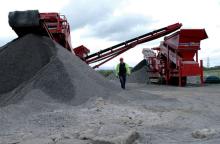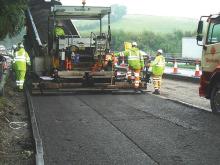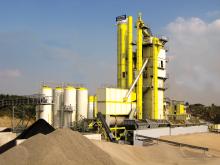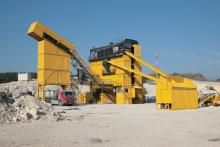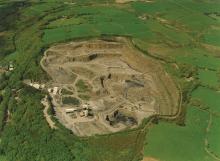
CE markings of asphalt materials will bring traceability that could clear the way for easier high performance recycling. Claire Symes reports
With gaining planning permission to extract virgin aggregates becoming increasingly difficult in Europe, the need to recycle has never been greater. But although the volume of recycled asphalt planings (RAP) being reused in roads is growing, most are placed back as base courses with additional virgin aggregates being used to form the surface courses.
Accurate milling techniques now allow each layer of asphalt to be accurately removed, but without proper records it is difficult to place confidence in what is being extracted.
"If we know exactly where the aggregate has come from, what sizes are in the mix, what bitumen binder was used, where the asphalt was produced and under what conditions, how it was transported to site and laid, we can have greater confidence in a recycled asphalt from this source," said Bonvallet.
"What limits our ability to deliver high quality recycled materials today is either lack of quality in the original material, absence of traceability and few economic drivers. But in the next five to 10 years conditions could change in Europe and make high performance recycling a real possibility." To explain what he means about lack of quality, Bonvallet points to the difference in asphalt production around Europe. "In France there is a growing trend for one company to operate the whole process, from the quarry to the asphalt plant as well as carrying out the surfacing work. They either come from the quarrying side, like
"This approach allows greater control over the quality of the aggregates coming out of the quarry," he explained. "This is why continuous asphalt plants, which use 50% dry mix, are more common in France and benefit the road market by producing a uniform material.
"In Germany, batch plant asphalt production is much more common as this offers much greater quality control at this stage. This is necessary because of the greater fragmentation in the German aggregates market with a larger number of smaller quarries, many of which are owned by families rather than large companies. The asphalt plants are often owned by another company who have no direct control over the quality of the asphalt, so batching plant production is essential. However, the batched nature of the product means that consistency varies and the price is often higher too." But according to Bonvallet, the difference is as much to do with national specifications as it is with cultural differences. "Eurovia has moved into the German market but has adopted German technology rather than using the same techniques as it does in the French market," he said. "European standards are being developed. In Western Europe these are often lower than the national standards and the new standard will be more important to create a benchmark in the new EU member countries."
Traceability
Better quality control at every stage in the asphalt production process is essential for maximising recycling potential. Nonetheless, knowing the differences between asphalt production in different countries is not enough to improve the performance of recycled asphalt alone - accurate records are needed to make the materials traceable.
"Aggregates, bitumens and fillers have been CE marked since 2004 and legislation for the marking of asphalt mixes will come into force soon, followed by surface dressing and microsurfacing in 2008/2009," said Bonvallet. "To gain CE marking, we must know everything about the production process from extraction through to the asphalt production.
"Accurate records of these details, plus information about the laying, will be needed to allow clients to check details of the material laid on their site right the way through its service life. These records will provide the traceability that is essential for future recycling work and take the guesswork out of the process, which usually prevents reuse at the same grade. The real value from recycling will come when we can reuse material as a wearing course." Currently, unless the recycling is carried out by the same contractor and someone remembers what was laid, testing of samples is the only way to check the as laid material. Test results provide a small snapshot of the material, but contractors usually have to assume that the result presents the best case scenario and often do not know exactly how thickly the material was placed over the whole site.
"How the information to provide this traceability is recorded needs to be resolved but the growing use of GPS equipment on pavers and compactors, should help to add the critical geographical details," said Bonvallet.
Increasing volumes
Some countries in Europe already recycle a lot of RAP.
"The increase in recycling needs to come not just from wider use of RAP but in the volume of RAP used in the asphalt mix," said Bonvallet. "Without traceability of the material, research suggests that up to 30% recycling is possible, but with materials from a known origin up to 65% could be achieved, although around 50% is a more likely figure.
"However, without economic drivers, achieving this level of recycling will be difficult and even with the political will to make it happen it could be up to 50 years before society sees the financial and environmental benefits. The biggest problem is that the cost of providing traceability is borne by the current surfacing but the benefit will not be seen until the end of its surface life, in some 20 to 30 years time.
"It is almost unheard of for an asphalt plant to be sold without recycling capabilities, so recycling is already seen as the future by the industry, so the rate of growth and potential are affected by legislation and the economy. CE marking will help provide a good legislative driver but taxes or incentives to reduce reliance on virgin aggregates and make recycling a financially attractive alternative are also necessary.
"Further restrictions on planning permission for new extraction sites will make recycling essential - the scarcity of virgin aggregate that will inevitably be created by dwindling reserves will push up aggregate prices, making reuse of existing materials vital.
"But the impact of tight planning laws on aggregates supply will not be fully seen for some time, so in the medium term, taxes such as the Aggregates Tax in the UK and similar initiative in the Netherlands and Sweden will help create the necessary economic drivers for recycling"

